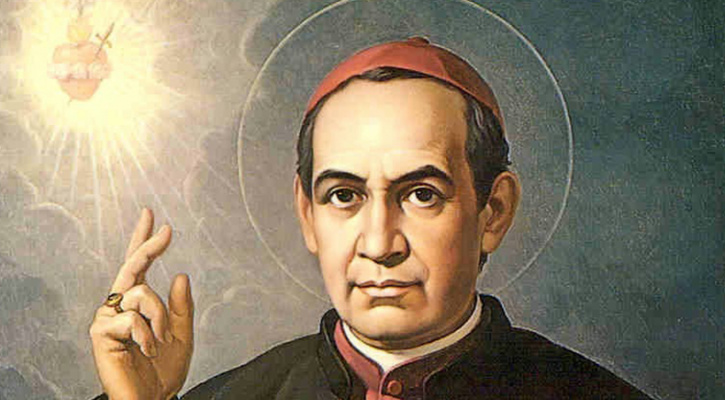Sant'Antonio Maria Claret, Saint of the day for 24 October

Saint of the day for October 24th
(23 December 1807 - 24 October 1870)
History of Sant'Antonio Maria Claret
The "spiritual father of Cuba" was a missionary, religious founder, social reformer, chaplain to the queen, writer and editor, archbishop and refugee. He was a Spaniard whose work took him to the Canary Islands, Cuba, Madrid, Paris and to Vatican Council I.
In his spare time as a weaver and draftsman in the textile factories of Barcelona, Anthony learned Latin and printing: the future priest and publisher was preparing. Ordained a priest at the age of 28, he was barred from entering religious life as a Carthusian or a Jesuit for health reasons, but he became one of Spain's most popular preachers.
Anthony spent 10 years offering popular missions and retreats, always placing great emphasis on the Eucharist and devotion to the Immaculate Heart of Mary. It was said that his rosary never got out of hand. At the age of 42 he founded a religious institute of missionaries starting with five young priests, known today as Claretians.
Anthony was appointed head of the much neglected archdiocese of Santiago in Cuba. He began his reformation by preaching and hearing almost incessant confessions, and suffered bitter opposition mainly to oppose concubinage and to instruct black slaves. A hired killer - whose release from prison Anthony had obtained - slashed his face and wrist. Anthony managed to turn the would-be murderer's death sentence into a prison sentence. His solution to the misery of the Cubans was family farms that produced a variety of foods for the family's needs and for the market. This aroused the enmity of vested interests who wanted everyone to work on a single income crop: sugar. In addition to all his religious writings, there are two books he wrote in Cuba: Reflections on Agriculture and Delights of the Country.
He was called back to Spain for a job he didn't like: being the queen's chaplain. Anthony went on three conditions: he would reside away from the palace; he would only come to hear the queen's confession and instruct the children; and would be exempted from court functions. In the revolution of 1868 he fled to Paris with the queen's party, where he preached to the Spanish colony.
All his life Anthony was interested in the Catholic press. He founded the religious publishing house, a major Catholic publishing firm in Spain, and wrote or published 200 books and pamphlets.
At Vatican I, where he was a staunch defender of the doctrine of infallibility, Anthony won the admiration of his fellow bishops. Cardinal Gibbons of Baltimore observed of him: "Here is a true saint." At the age of 63 he died in exile near the Spanish border.
Reflection
Jesus foretold that those who are truly his representatives would suffer the same persecution as he did. In addition to 14 attempts on his life, Anthony had to suffer such a barrage of nasty slander that the name Claret itself became synonymous with humiliation and misfortune. The powers of evil do not easily abandon their prey. Nobody needs to seek persecution. All we have to do is make sure that we are suffering because of our genuine faith in Christ, not our whims and lack of prudence.